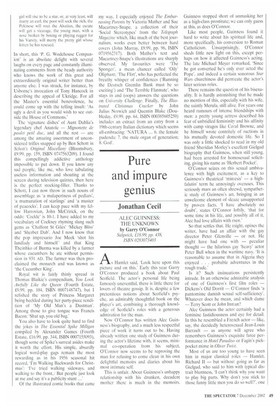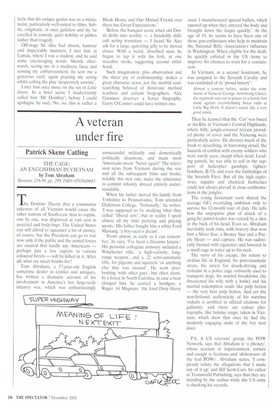Pure and impure genius
Jonathan Cecil
ALEC GUINNESS: THE UNKNOWN by Garry O'Connor Sidgwick, £18.99. pp. 438, ISBN 0283073403
As Hamlet said, 'Look here upon this picture and on this.' Early this year Garry O'Connor produced a book about Paul Scofield. The actor's personal life being famously uneventful, there is little there for lovers of theatre gossip. It is, despite a few pretentious notions about Scofield's psyche, an admirably thoughtful book on the player's art, combining a thorough knowledge of Scofield's roles with a generous admiration for the man.
Now O'Connor has written Alec Guinness's biography, and a much less respectful piece of work it turns out to be. Having already written one study of Guinness during the actor's lifetime with, it seems, minimal co-operation from his subject, O'Connor now seems to be reproving the man for refusing to come clean in his own delightful memoirs and diaries about his most intimate self.
This is unfair. About Guinness's unhappy relationship with his drunken, decadent mother there is much in the memoirs. Guinness stopped short of unmasking her as a high-class prostitute; we can only guess at this, as does O'Connor.
Like most people, Guinness found it hard to write about his spiritual life and, more specifically, his conversion to Roman Catholicism. Unsurprisingly, O'Connor sheds little new light on this, except perhaps on how it affected Guinness's acting. The late Michael Meyer remarked, 'Since he got converted he's only ever acted the Pope', and indeed a certain sonorous Star Wars churchiness did permeate the actor's later serious roles.
There remains the question of his bisexuality. It is hardly astonishing that he made no mention of this, especially with his wife, the saintly Merula, still alive. For years one heard rumours of intense friendships with men: a pretty young actress described his fear of unbridled femininity and his affinity with camp viragos like Coral Browne, and he himself wrote contritely of ructions in his mutually devoted domestic life. So I was only a little shocked to read in my old friend Sheridan Morley's excellent Gielgud biography that Guinness, when still young, had been arrested for homosexual soliciting, giving his name as 'Herbert Pocket'.
O'Connor seizes on this sexual ambivalence with high excitement, as a key to Guinness's theatrical 'mimesis' — a highfalutin term he annoyingly overuses. This seriously mars an often shrewd, sympathetic study of Guinness's art, bringing in an unwelcome element of sleaze unsupported by proven facts. 'I have absolutely no doubt', states O'Connor loftily, 'that for some time in his life, and possibly all of it, Alec had love affairs with men.'
So that settles that. He might, opines the writer, have had an affair with the gay director Peter Glenville — or not. He might have had one with — peculiar thought — the hilarious gay `heavy' actor Peter Bull when in the wartime navy. 'It is reasonable to assume that in Algeria they enjoyed . . . probable adventures in the rough trade.'
Is it? Such insinuations persistently intrude. In an otherwise admirable analysis of one of Guinness's first film roles — Dickens's Old Dorrit — O'Connor finds 'a pantomime damish sexual self-sufficiency'. Whatever does he mean, and which dame — Terry Scott or John Inman?
Alec Guinness the actor certainly had a feminine fastidiousness and eye for detail. In this he resembled a French actor — like, say, the decidedly heterosexual Jean-Louis Barrault — as anyone will agree who remembers Guinness's exquisite farce performance in Hotel Paradiso or Fagin's pickpocket mime in Oliver Twist.
Most of us are too young to have seen him in major classical roles — Hamlet, Richard II — but without going as far as Gielgud, who said to him with typical distrait bluntness, 'I can't think why you want to play big parts. Why don't you stick to those funny little men you do so well?', one feels that his unique genius was as a miniaturist, particularly well-suited to films. Subtle, enigmatic. at once guileless and sly, he excelled in comedy, quiet nobility or pathos rather than tragedy.
Off-stage Sir Alec had charm, humour and impeccable manners. I met him at Lamda, where I was a student, and he said some encouraging words. Shortly afterwards, seeing me in a mediocre farce and sensing my embarrassment, he sent me a generous card, again praising my acting whilst calling the play 'desperately unwitty'.
I met him once more on the set of Little Don-it. In a brief scene I inadvertently called him `Mr Dombey'; before I could apologise he said, `No, no. this is rather a
Bleak House and Our Mutual Friend over there has Great Expectations.'
Before the banquet scene when old Dorrit drifts into senility — a fiendishly difficult acting transition — I heard Sir Alec ask for a large, quivering jelly to be moved closer. With a weird, absorbed stare he began to tap it with his fork, at one macabre stroke suggesting second childhood.
Such imagination, plus observation and the sheer joy of craftsmanship, makes a great character actor, not the morbid soulsearching beloved of third-rate method teachers and certain biographers. Alec Guinness deserves a better biography. Garry O'Connor could have written one. used. I manufactured special bullets, which opened up when they entered the body and brought down the target quickly.' At the age of 19. he seems to have been one of those gun-enthusiasts who help to maintain the National Rifle Association's influence in Washington. When eligible for the draft, he quickly enlisted in the US Army to improve his chances to train for a commission.
In Vietnam, as a second lieutenant, he was assigned to the Seventh Cavalry and was reminded of its 'proud history':
Almost a century before, under the command of General George Armstrong Custer, the regiment was cut to pieces in a heroic last stand against overwhelming Sioux odds at Little Big Horn. It doesn't sound like a very good omen.
Then he learned that the `Cav' was based at An Khe in Vietnam's Central Highlands, where hilly, jungle-covered terrain provided plenty of cover and the Vietcong were particularly active. He devotes much of the book to describing, in harrowing detail, the hazards of combat with enemy soldiers who were rarely seen, except when dead. Leading patrols, he was able to call in the support of helicopter gunships, fighterbombers, B-52s and even the battleships of the Seventh Fleet. But all the high explosives, napalm and chemical herbicides could not always prevail in close confrontations in the jungles.
The young lieutenant soon shared the average GI's overriding ambition only to survive his 12-month tour of duty. He tells how the unpopular plan of attack of a gung-ho patrol-leader was vetoed by a shot in the back of his head. Even so, Abraham inevitably took risks, with bravery that won him a Silver Star, a Bronze Star and a Purple Heart — and capture. He was sadistically burned with cigarettes and lowered in a small cage in water up to his neck.
The story of his escape, his return to civilian life in England, his post-traumatic stress, his arrest for drunk-driving and restraint in a police cage ordinarily used to transport dogs, his marital breakdown (he threatened his wife with a knife) and his marital redemption reads like pulp fiction — the very best pulp fiction. And yet the non-fictional authenticity of his wartime ordeals is certified in official citations for gallantry, and there are colour photographs, like holiday snaps, taken in Vietnam, which show that once he had the modestly engaging smile of the boy next door.
P.S. A US veterans' group, the POW Network, says that Abraham is 'a phoney', whose account of imprisonment, torture and escape is fictitious and 'dishonours all the real POWs'. Abraham states, 'I completely refute the allegations that I made any of it up' and Bill Scott-Carr, his editor at Transworld Publishing, says that they are standing by the author while the US army is checking his records.











































































 Previous page
Previous page